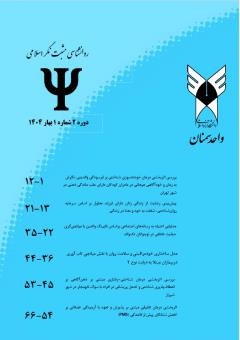بررسی اثربخشی درمان شناختی–رفتاری مبتنی بر ذهنآگاهی بر انعطافپذیری شناختی و تحمل پریشانی در افراد با سوگ نابهنجار در شهر شیراز
محورهای موضوعی : روانشناسی مثبت نگر اسلامی
1 - کارشناسی ارشد روانشناسی بالینی، دانشگاه آزاد اسلامی واحد مرودشت، مرودشت، ایران.
کلید واژه: درمان شناختی–رفتاری, ذهنآگاهی, انعطافپذیری شناختی, تحمل پریشانی, سوگ نابهنجار.,
چکیده مقاله :
پژوهش حاضر با هدف بررسی اثربخشی درمان شناختی–رفتاری مبتنی بر ذهنآگاهی بر انعطافپذیری شناختی و تحمل پریشانی در افراد با سوگ نابهنجار در شهر شیراز طراحی و اجرا شد. جامعه آماری این مطالعه شامل تمامی افراد بزرگسال با تجربه سوگ نابهنجار بود که به مراکز مشاوره و رواندرمانی شهر شیراز مراجعه کرده بودند. نمونهگیری به روش در دسترس انجام شد و در مجموع، ۳۰ نفر برای شرکت در پژوهش انتخاب شدند و به طور تصادفی در دو گروه آزمایش و کنترل جایگزین شدند. گروه آزمایش درمان شناختی–رفتاری مبتنی بر ذهنآگاهی را در قالب ۸ جلسه ۹۰ دقیقهای هفتگی دریافت کرد، در حالی که گروه کنترل هیچ مداخلهای دریافت نکرد. دادهها با استفاده از پرسشنامه انعطافپذیری شناختی (دنیس و ونادروال، ۲۰۱۰) و پرسشنامه تحمل پریشانی (سیمونز و گاهر، ۲۰۰۵) گردآوری شد و تحلیل دادهها با استفاده از روش تحلیل کوواریانس انجام گرفت. نتایج نشان داد که مداخله درمانی موجب افزایش قابل توجه انعطافپذیری شناختی و تحمل پریشانی در گروه آزمایش شد، در حالی که گروه کنترل تغییر معنیداری را تجربه نکرد.
The present study was designed and implemented to investigate the effectiveness of mindfulness-based cognitive-behavioral therapy on cognitive flexibility and distress tolerance in individuals with abnormal grief in Shiraz. The statistical population of this study included all adults with abnormal grief who had referred to counseling and psychotherapy centers in Shiraz. Sampling was conducted using the convenience method, and a total of 30 people were selected to participate in the study and were randomly assigned to two experimental and control groups. The experimental group received mindfulness-based cognitive-behavioral therapy in the form of 8 90-minute weekly sessions, while the control group did not receive any intervention. Data were collected using the Cognitive Flexibility Questionnaire (Dennis & Van der Valk, 2010) and the Distress Tolerance Questionnaire (Simmons & Gahr, 2005), and data analysis was performed using the analysis of covariance method. The results showed that the therapeutic intervention significantly increased cognitive flexibility and distress tolerance in the experimental group, while the control group did not experience any significant change.
منابع
برادران، مجید؛ رنجبر نوشری، فرزانه. (۱۴۰۰). «نقش انعطافپذیری شناختی و سبکهای دلبستگی در شناخت اجتماعی دانشجویان». مجله روانشناسی پژوهش دانشگاه پیام نور، ۸ (3)، ۱۳۷ ۱۵۴.
براون، سارا؛ احمدی، نرگس؛ رضایی، سمانه. (۱۴۰۰). بررسی تجربه سوگ در فرهنگهای مختلف: مرور نظاممند. فصلنامه روانشناسی فرهنگی، ۳(۲)، ۵۵–۷۲.
دلاور، علی. (۱۳۸۵). روش تحقیق در روانشناسی و علوم تربیتی. تهران: انتشارات رشد.
شاره، محمدحسین؛ فاضلی، محمد؛ محمدخانی، شهرام. (۱۳۹۲). بررسی ویژگیهای روانسنجی پرسشنامه انعطافپذیری شناختی در دانشجویان ایرانی. فصلنامه روانشناسی شناختی، ۱(۲)، ۴۵–۶۰.
فاضلی، محمد؛ شاره، محمدحسین؛ محمدخانی، شهرام. (۱۳۹۳). بررسی ویژگیهای روانسنجی نسخه فارسی پرسشنامه تحمل پریشانی در جمعیت ایرانی. پژوهشهای روانشناسی بالینی، ۲(۱)، ۲۵–۴۰.
قشقایی، زهرا؛ زارعی، علی؛ پاشایی، نرگس. (۱۴۰۱). بررسی نشانههای سوگ نابهنجار در جمعیت بزرگسال ایرانی. مجله روانشناسی بالینی ایران، ۱۴(۳)، ۹۱–۱۰۸.
محمدی، فاطمه؛ احمدی، نرگس؛ رضایی، سمانه. (۱۳۹۶). اعتباریابی نسخه فارسی پرسشنامه تحمل پریشانی در دانشجویان. فصلنامه پژوهشهای روانشناسی سلامت، ۹(۳)، ۷۵–۹۰.
موسوی، الهام؛ صفری، ناهید؛ یوسفی، نرگس. (۱۳۹۸). رابطه انعطافپذیری شناختی با سازگاری سوگ در زنان داغدیده. فصلنامه روانشناسی شناختی، ۱۰(۴)، ۴۷–۶۳.
نجفی، زهرا؛ حسینی، مهدی؛ شریفی، نرگس. (۱۳۹۷). بررسی الگوهای سوگواری در خانوادههای شیرازی: مطالعهای فرهنگی. مطالعات جامعهشناسی فرهنگی ایران، ۶(۱)، ۷۵–۹۲
نظری، فاطمه؛ حسینی، مهدی؛ کاظمی، ندا. (۱۳۹۹). نقش حمایت اجتماعی در سازگاری با فقدان: مطالعهای بر سوگ طبیعی. پژوهشهای روانشناسی سلامت، ۸(۱)، ۲۳–۴۰.
نظری، فاطمه؛ حسینی، مهدی؛ کریمی، سارا. (۱۴۰۰). تحمل پریشانی و نقش آن در سوگ نابهنجار: بررسی تجربی. پژوهشهای روانشناسی بالینی، ۹(۲)، ۳۳–۵۰.
نعمتی، مریم؛ کریمی، سارا؛ جمشیدی، ناصر. (۱۴۰۰). پیامدهای روانشناختی سوگ نابهنجار: نقش واسطهای کیفیت روابط بینفردی. روانشناسی خانواده، ۱۲(۲)، ۶۵–۸۲.
Bonanno, G. A., Westphal, M., & Mancini, A. D. (2020). Resilience to loss and potential trauma. Annual Review of Clinical Psychology, 16, 1–25.
Chambers, R., Gullone, E., & Allen, N. B. (2009). Mindful emotion regulation: An integrative review. Clinical Psychology Review, 29(6), 560–572.
Dennis, J. P., & Vander Wal, J. S. (2010). The cognitive flexibility inventory: Instrument development and estimates of reliability and validity. Cognitive Therapy and Research, 34(3), 241–253.
Dennis, J. P., & Vander Wal, J. S. (2010). The Cognitive Flexibility Inventory: Instrument development and estimates of reliability and validity. Cognitive Therapy and Research, 34(3), 241–253.
Garland, E. L., Farb, N. A., Goldin, P. R., & Fredrickson, B. L. (2015). Mindfulness broadens awareness and builds eudaimonic meaning: A process model of mindful positive emotion regulation. Psychological Inquiry, 26(4), 293–314.
Gratz, K. L., Bardeen, J. R., & Davis, M. T. (2016). Development and initial validation of an instrument assessing emotional regulation difficulties in the context of distress tolerance. Journal of Psychopathology and Behavioral Assessment, 38(2), 315–325.
Hofmann, S. G., Sawyer, A. T., Witt, A. A., & Oh, D. (2010). The effect of mindfulness-based therapy on anxiety and depression: A meta-analytic review. Journal of Consulting and Clinical Psychology, 78(2), 169–183.
Martin, M. M., & Rubin, R. B. (1995). A new measure of cognitive flexibility. Psychological Reports, 76(2), 623–626.
Segal, Z. V., Williams, J. M. G., & Teasdale, J. D. (2018). Mindfulness-based cognitive therapy for depression (2nd ed.). New York: Guilford Press.
Shear, M. K., Simon, N., Wall, M., Zisook, S., Neimeyer, R., Duan, N., & Keshaviah, A. (2011). Complicated grief and related bereavement issues for DSM-5. Depression and Anxiety, 28(2), 103–117.
Simons, J. S., & Gaher, R. M. (2005). The Distress Tolerance Scale: Development and validation of a self-report measure. Motivation and Emotion, 29(2), 83–102.
Simons, J. S., & Gaher, R. M. (2005). The Distress Tolerance Scale: Development and validation of a self-report measure. Motivation and Emotion, 29(2), 83–102.
Stroebe, M., Schut, H., & Boerner, K. (2017). Cautioning health-care professionals: Bereaved persons are misguided through the stages of grief. Omega: Journal of Death and Dying, 74(4), 455–473.


